When chatting to a lady named Cathy at a house party one Friday she asked if I was free next week to attend her wedding.
Without much hesitation I said yes and the following Saturday morning myself and Leoni (German housemate) were off to church.
The day was captivating, and this is what happened.
1.
I think I’ve been to about five weddings in my life, and this one started like the English ones.
We entered a church in the city and, as a guest of the bride, took our seats on the left. The pews began to fill and familiar faces greeted each other.
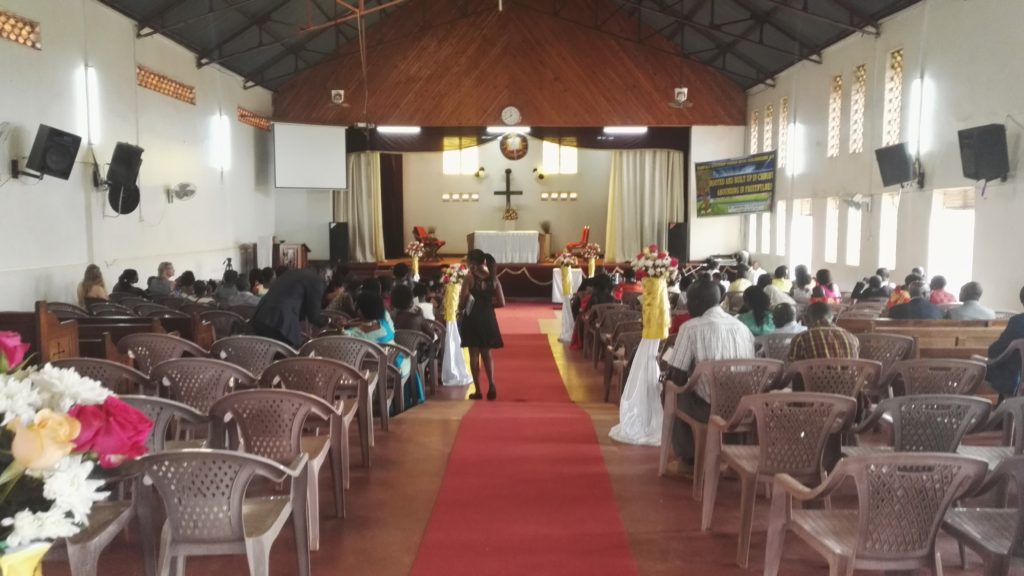
The vicar came out and prepped us that proceedings were about to kick off and flicking through the programme I could see the a recognisable schedule of hymns, readings and “I do”s.
As soon as he came to front though there was a slight detour in what I’d experienced previously.
Reverend Moses soon had the congregation in giggles as he welcomed the wedding entourage and commented how Collins had done well to lock Cathy down. Many in attendance, he said, would volunteer to take his place today.
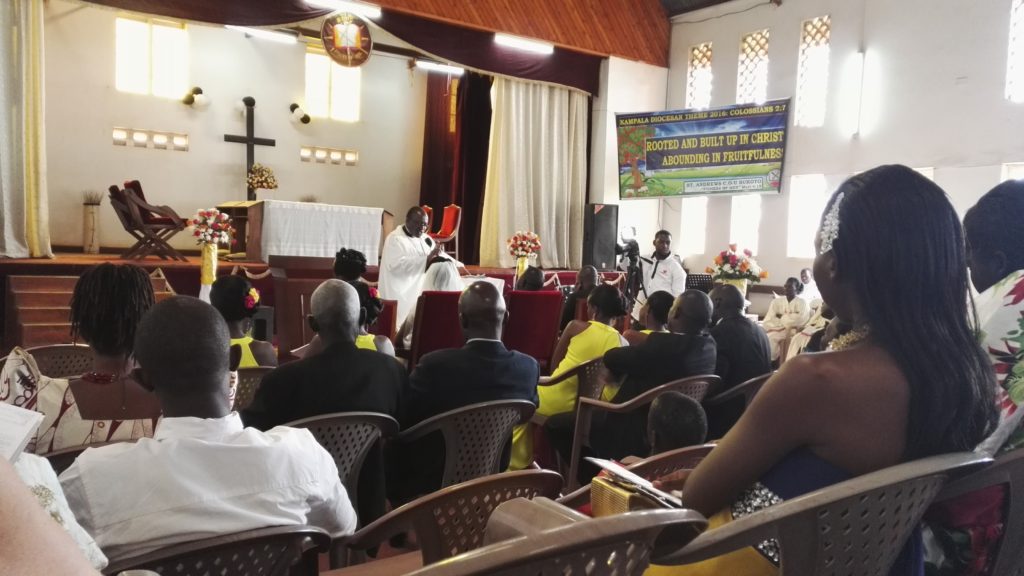
After everyone was in place and the rings were on, Moses sat down the newlyweds and gave them life lessons, again laced with humour and often through metaphor: “when I was at school we learnt how a plant in a box was attracted to light. If you don’t tell your wife you love her, she will move to someone who does”
The audience were relaxed and called out “A-men” when something sounded good.
To communicate “I agree” they would call out “aye-aye-aye-aye-aye” in a quick high pitched type yodel.
This meant that when it got to the bit about how the man should be willing to die for his wife, and the wife should submit to her husband, the church was reverberating with these elated wailing calls.
Moses concluded the ceremony after an hour and everyone walked out to “Happy Days” to take pictures.
2.
Cathy and Collins are atypical in Uganda.
When we met, she told me about her children and how she and Collins had made a conscious decision to have only two.
She acknowledged that having just two children was “Western” but, with Collins’ job at the Sheraton hotel, they were able to pay for both to have a private education to give them the best start in life.
Their families were slightly perturbed that they had raised children out of wedlock, but were happy they were now tying the knot.
And it was Cathy’s father (Patrick) who, after the ceremony, invited us back to his sister’s house for a snack before going to the reception.
Beatrice’s house was about a fifteen minute drive away (a minibus had been hired) and Leoni and I were greeted by about twenty family members all sat in the living room.
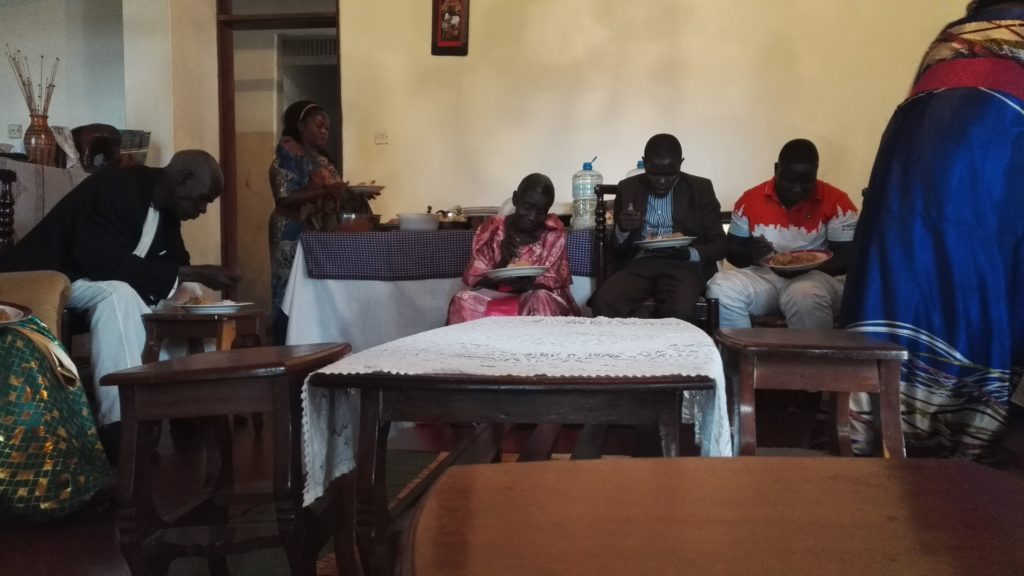
Food was provided for all, and Beatrice dished out beans and a combination of white carbs for us to eat. Cutlery was passed around until it ran out, and the elders of the room instinctively ate with their hands.
Once replete, everyone said a prayer of thanks, and then returned to the minibuses. I was able to exercise one of the approximately six Lugandan phrases I know (“Webale Nyo”: “Thank you very much”) and we took to the road to go south of the city.
3.
I’ve been told that there are two types of ceremony for each Ugandan wedding: a traditional ceremony, and a western ceremony.
This was the latter, meaning Cathy wore a long white dress and Collins and the ushers were in tails.
The guests though were wearing traditional dress.
For the men this is pretty unimaginative, with most in simply a suit, but the women’s attire was much more remarkable.
It was kind of like an Indian sari, with heavy, shiny, colourful cloth wrapped around their bodies. Interestingly though the shoulders were padded out and pointed up like little triangles.
From behind the dress looked like the outline of a cartoon cat
The younger females at the reception were mainly in modern frocks (is that an oxymoron?) and the catering staff wore uniforms with loud patterns.
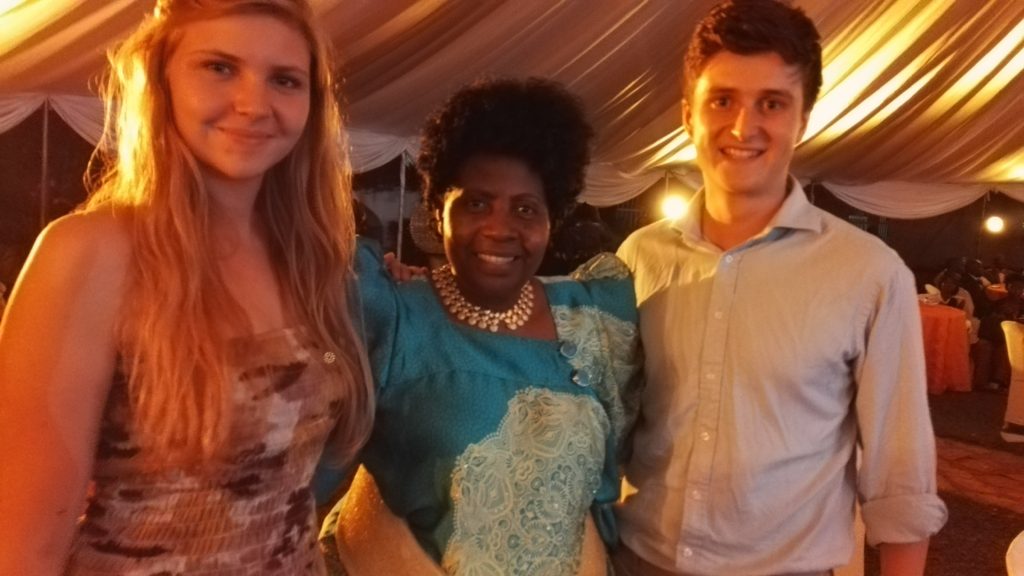
We took a seat with Patrick’s brother (also called Moses) and his wife (Maureen) on one of the 20ish tables in the large gazebo.
4.
It was only once the reception started properly that I realised the morning ceremony in the church had been in English.
Moses’ son (Abraham, Cathy’s cousin and also a doctor) was a sort of MC, directing the DJ and introducing the various forms of entertainment.
At least I’m guessing that was the case as he was speaking Lugandan and only occasionally said one of my six stock phrases.
Multi-language sentences
As a slight aside, at times I’ve found the whole being to speak multiple languages thing quite amusing.
People can slip in and out of dialects seamlessly and often in the same sentence. When it’s a local language to English it means getting a snippet of information about what they were just saying, leaving you to wonder what the context is.
Often it’s when the base language doesn’t have a word for what they are explaining which, I guess, is because the concept they are talking about wasn’t introduced until, in our example, English was spoken.
Favourites have included:
“… and get an Uber”
“… Monitoring and evaluation”
“…. nagging woman”
One point where English was spoken was when Abraham gave Leoni and I shout out and then did a little skit about the word “muzungu” (word used in East Africa for foreigner).
5.
The food was traditional and plentiful.
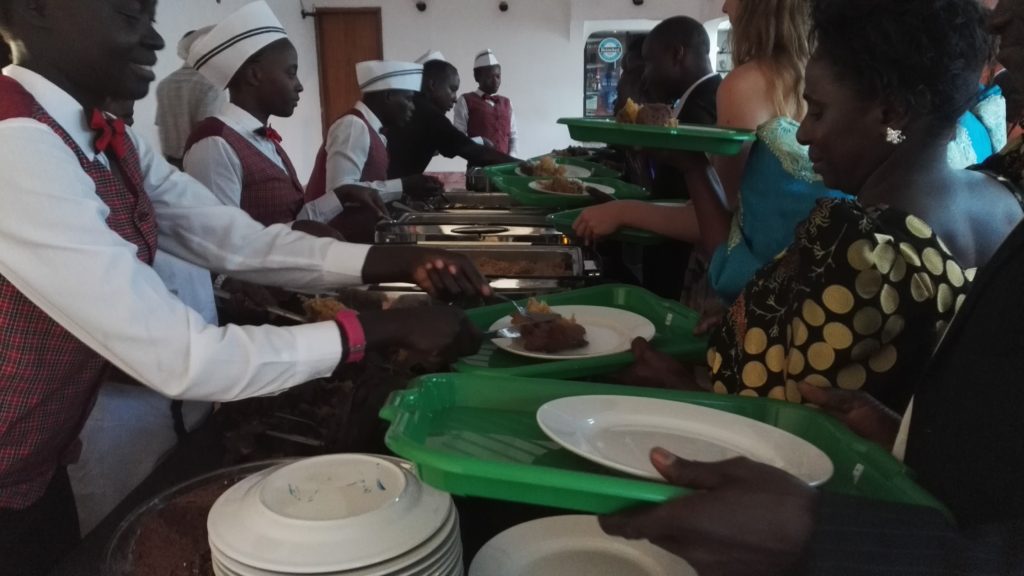
Each table took turns to go up and be served a variety of local dishes from the buffet. Patrick was a fan of millet and so got a double helping.
I asked him about his speech and he assured me there would be jokes as the last thing people want after a dense meal is an even heavier speech.
Whilst tucking into our heap of food, the DJ put on country music which was a surprise to me and Leoni, but no one else. It’s quite common here, Moses told me, and we ate in silence listening to the dulcet tones of a generic American Midwestern singer.
(As a side note, is anything other than “tones” described as “dulcet”?)
Anyway things shifted back from America to Africa with the beat of a drum.
An incredibly energetic troupe of musicians and dancers kept everyone’s attention for a good fifteen minutes as they rhythmically danced around the gazebo keeping the beat.
6.
Patrick took to the stage once everyone had settled down and finished their food.
Speeches here were different to what I had experienced at other weddings I’d been to. People who are important in the bride/ groom’s life would take it in turns to get up and speak with other people from that “group”.
For both Cathy and Collins we had their friends, aunties/uncles, and brothers/sisters.
When Collins’ siblings were called, 16 people lined up
It was only then that the impact of having a large or small family really hit me.
With Collins’ children now, it’s not just that the pot for school fees can be divided by 2 rather than 17, it’s also the time and strength of relationship that can be forged.
Collins’ father spoke in English and I got a sense of distance in the way he was speaking about his third eldest son.
Moses (one of ten) was pretty matter of fact that he didn’t know the age of his eldest sister and I can imagine how a finite reserve of “cousin goodwill” could be diluted as the numbers multiply out. Most people in the room seemed to be cousins.
Nevertheless there was a definite sense of deference when it came to the elder members of the family.
Being sat next to Moses and Maureen meant several times their nephews and nieces came and knelt at the feet to have a catch up and see how things were.
7.
Every time someone took to the front they danced rather than walked.
When the speeches were complete Cathy and Collins did the rounds and received presents from the tables of family and friends.
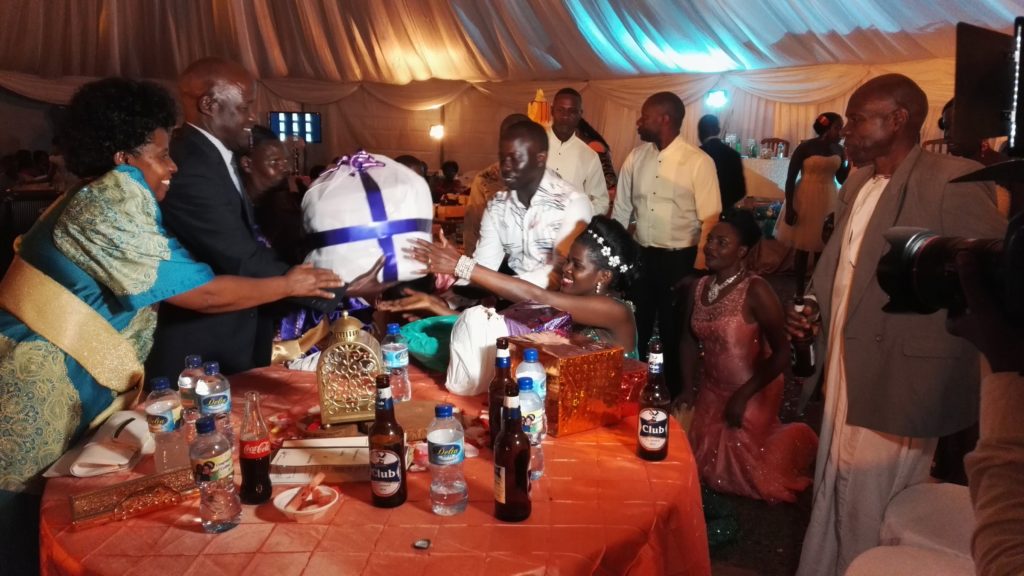
They and the entourage then had a wardrobe change and made a reappearance which again brought everyone to their feet.
Once they, the ushers and the bridesmaids finished their coordinated dances it signalled the beginning of the party proper and people started making their way to the d-floor.
The music was mainly Ugandan pop, though Ed Sheeran made an appearance
Needing to get back to town Leoni and I said our goodbyes to the relevant people and left everyone to groove.
Conclusion
Weddings are great not just because everyone is generally happy, but it also offers a window into another culture.
Besides the obvious aspects such as traditional dress, music and food we got to observe some of the undercurrents of how the Buganda tribe operate.
Weddings are obviously a religious ceremony, but thanks to the Lord were a regular occurrence throughout the day that I noticed. Watching the dynamics between family members was also interesting.
The use of technology was much as it was back home: people taking out their smartphones to get a snap of the happy couple and big screens showing pre recorded videos from well wishers.
This was my last full day in Uganda and was an excellent way to conclude the trip.